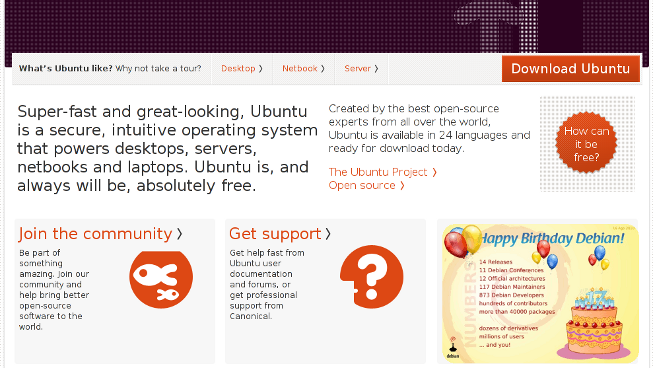There’s some hype in the Ruby community about RVM (Ruby Version Manager). It’s a tool that allows to switch between Ruby versions on the same system (much like what the alternatives system provides for Java on Debian, except that RVM does it either system-wide or per-user).
However, when you look at it, RVM looks quite scary.
The recommended installation instruction is:
bash < <( curl http://rvm.beginrescueend.com/releases/rvm-install-head ).
That script doesn’t use set -e, and actually does a git clone behind the scenes. Without first checking that git is installed. But if you don’t have git installed, it’s not a problem: there’s another script later on the page that downloads and compiles it for you.
After installing RVM itself, you need to install rubies (different ruby implementations). Use rvm install ree,1.9.2-head,jruby. That will automatically download and build the various versions in your homedir. It’s interesting to note the the compilation messages were probably too scary, and are not displayed.
But how does it handle the switch between different versions ? First, you need to add some magic to your .bashrc:
[[ -s "$HOME/.rvm/scripts/rvm" ]] && . "$HOME/.rvm/scripts/rvm"
or, for a system-wide install of rvm:
[[ -s "/usr/local/rvm/scripts/rvm" ]] && . "/usr/local/rvm/scripts/rvm"
And then, you can select your ruby implementation using rvm --default 1.9.2, for example. That works by redefining $PATH:
# echo $PATH
/usr/local/rvm/gems/ruby-1.9.2-p0/bin:/usr/local/rvm/gems/ruby-1.9.2-p0@global/bin:/usr/local/rvm/rubies/ruby-1.9.2-p0/bin:/usr/local/bin:/usr/local/bin:/usr/local/sbin:/usr/sbin:/usr/bin:/sbin:/bin:/usr/bin/X11
Of course, that’s quite fragile: if you are in one of the cases where bash doesn’t read .bashrc, or if you happen to be using dash, you lose.
Looking at the code of RVM itself, it is also very fragile: it’s pure bash, without any error handling. During my test (in a chroot), I often got error messages about missing commands that were apparently ignored. The installer insists on using colors, and spews lots of error messages if executed without a controlling tty. There are also some interesting code snippets like perl -e 'sleep 0.5'.
So, where do we go from here? Well, obviously, with my Debian hat, I’m not going to advocate a solution that makes everything possible to avoid the distribution’s packaging system, and I don’t see RVM being packaged in Debian anytime soon.
In Debian, we already provide co-installability of Ruby 1.8 and 1.9.2, and users are free to choose which one to use on a per-script basis, by running them with version-suffixed ruby executables. The ‘ruby’ executable itself still points to 1.8, as it’s clearly too early to make 1.9.2 the default. Many Ruby libraries are provided for both 1.8 and 1.9.2, and we plan to discuss changes in the packaging system to be able to make it easier to provide packages for both versions. There’s also recent work on packaging JRuby, but it’s quite hard as it requires removing all the non-free or undistributable parts, and packaging them separately.
